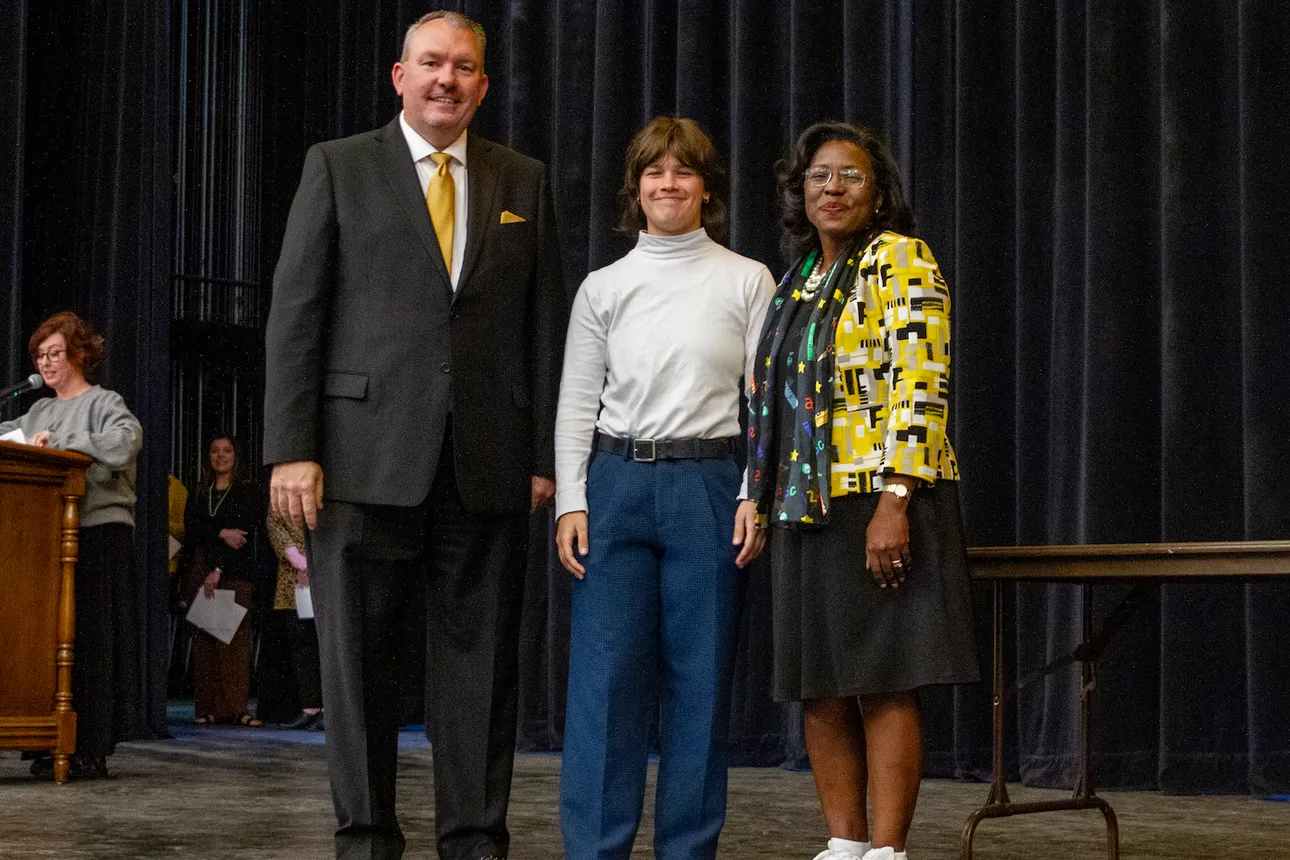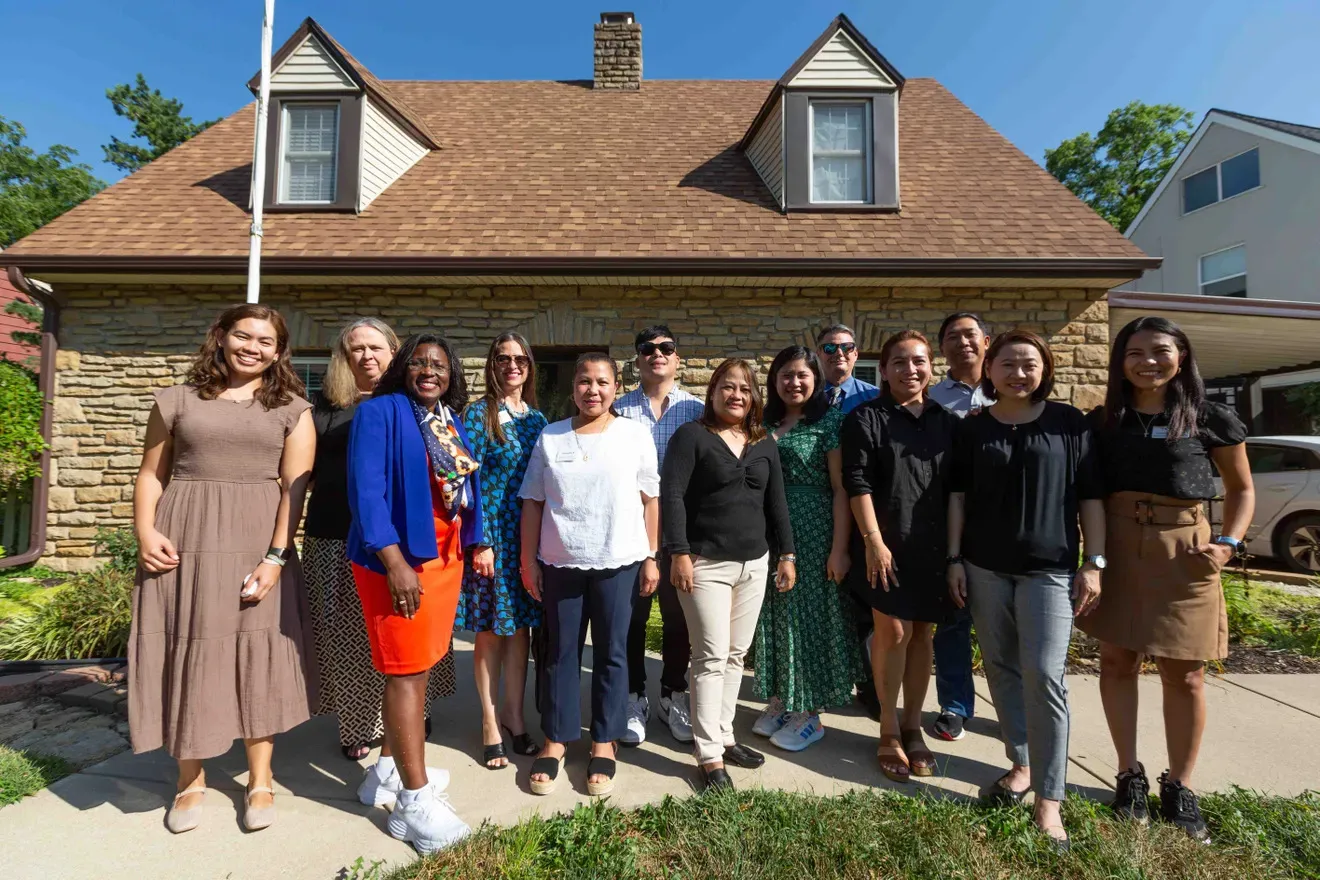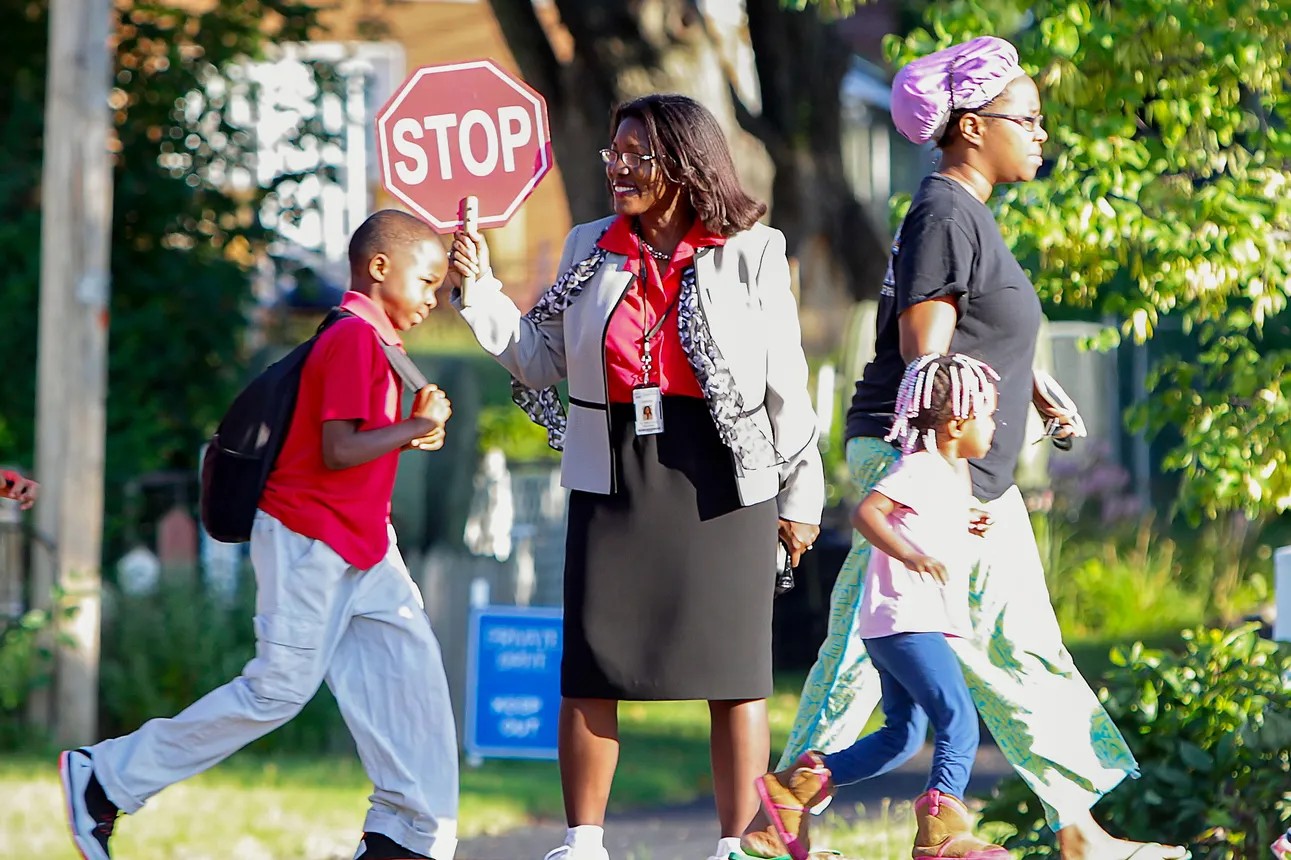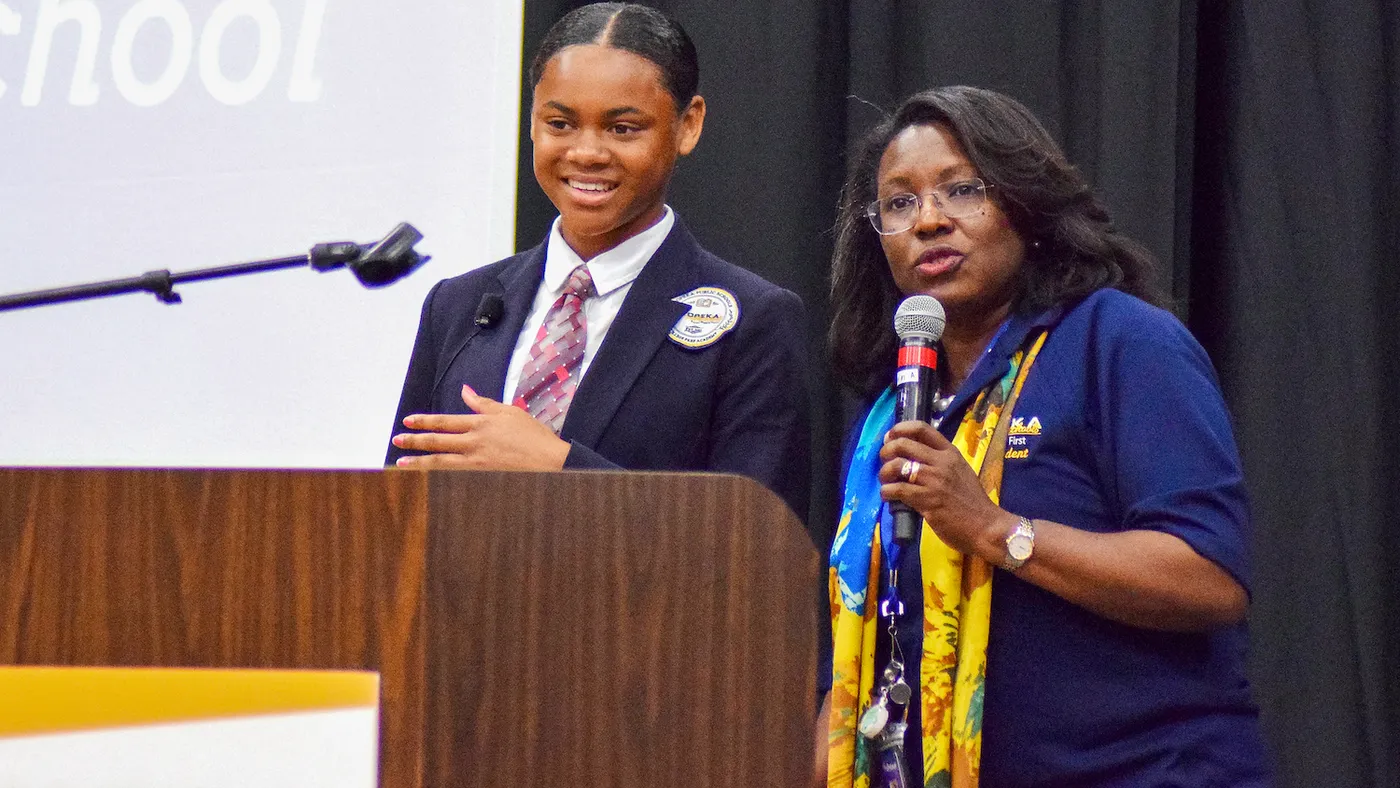To say Tiffany Anderson embraces a sneakers-on-the-ground approach to district leadership doesn’t begin to paint a full picture of her impact on Kansas’ Topeka Public Schools.
Anderson’s eight-year tenure leading the 13,000-student, 31-school district alone makes her an outlier among many of her peers — superintendents tend to stick around an average of three to five years. But what truly stands out is her commitment to challenging the status quo and using education as a vehicle to lift vulnerable populations.
The first Black woman superintendent of Topeka — the school district famously at the center of the U.S. Supreme Court’s 1954 ban on school segregation in Brown v. Board of Education — has been recognized by publications like The Washington Post over the course of her 30-year career in education for making schools “work” for poor children.
During Anderson’s time in Topeka, the district’s five high schools have increased their graduation rates to 90% or above, up from 60% to 78% when she arrived. She has reimagined and simplified the district leadership structure, invested in recruiting international teachers to fill workforce needs, and forged partnerships to provide holistic services to students and families.
And to top it all off, she still finds time to get into the classroom and inspire students by teaching a grade 7-8 career exploration course twice a week.

Reimagining organizational structures
Within a year of taking the reins in Topeka, Anderson set out to streamline the district’s organizational structure and decentralize its central office, says Dustin Dick, principal of Topeka High School and Topeka Center for Advanced Learning and Careers. Dick is also the district’s lead high school principal, career and technical education coordinator, and athletic director.
Carrying that list of roles and responsibilities in one organization can seem daunting at first glance, but Dick says the move to distribute leadership across fewer administrative layers — and fewer people in the central office — has made the district run more efficiently.
“If something's going on, she doesn't want it to be 567 steps to get to her.”

Angela Pomeroy
Principal of Jardine Elementary School and lead elementary school principal of Topeka Public Schools
“I think what principals probably notice and feel a little bit is that some of the people who are supervising them or making decisions around the things we do are also doing the same exact job that you're doing,” says Dick. While in some districts, “you hear people say, ‘Those people downtown forgot what it's like to be in a school’ — nope. Because we're still sitting here running schools of our own.”
Angela Pomeroy, principal of Jardine Elementary School and Topeka's lead elementary school principal, says Anderson “really cleared out the extra layers,” allowing funds and administrative supports to be reallocated around the school district.
While district leadership still includes an assistant and deputy superintendent, a director of assessment and demographics, and directors of areas like special education and homeless services, the district’s three lead principals — for elementary, middle, and high school — typically have a direct line to Anderson.
“If principals get stuck or they have questions or need to problem-solve, then they start with us,” says Pomeroy. “But she also wants to be that close to her administrators, too. It's not like she's never too busy to help us problem-solve … but if something's going on, she doesn't want it to be 567 steps to get to her.”

A helping hand with housing
Anderson views schools as community hubs that go beyond education to help students, staff and families, and she puts her money where her mouth is — literally. She has used as much as 20% of her $248,000 salary to purchase houses that have been used as transitional living spaces for international educators or for district staff in need.
“Dr. Anderson believes in giving at least 10%-20% back to help others so she gives back to the district 10%-20% in various ways, and housing is one of those ways,” says Aarion Gray, general director of instructional services and communication for Topeka Public Schools.
“She often says, ‘We are one family, and as in any family, when it's possible to assist with staff or parents in areas of need to help address academic, economic and physical health, it's part of our responsibility as a community to do what we can to care for one another in ways we can.’”
When international teachers arrive, "the transition is very difficult, and it's so hard — not just emotionally, but also mentally and physically,” says Cherryl Delacruz, a Topeka teacher who has experienced this.
“Dr. Anderson really made the transition easier for us,” says Delacruz, a high school math teacher who emigrated from the Philippines in 2008. Delacruz says the district currently has at least 50 international teachers from countries like the Philippines, India, China and Jamaica.
At times, Delacruz says, Anderson has also opened her home to international teachers while they awaited approval on apartments, or arranged transportation for them to get to school or grocery store. Anderson has also worked with local apartment complexes to secure rent discounts for Topeka educators, according to The Topeka Capital-Journal.
The transitional homes — which can house three or four teachers as roommates, says Regina Franklin, the district’s McKinney-Vento liaison — aren’t bare, either. They come equipped with furniture, appliances and other necessities Anderson has acquired from estate sales.
“That's just very compassionate of her to do that,” says Pomeroy.
Along with providing these properties to temporarily house international teachers, Anderson has also used the homes to help families and staff in need. “At least one” of the properties has served as a home for a family identified as needing assistance, says Franklin, who coordinates services for district families experiencing homelessness under the McKinney-Vento Homeless Assistance Act.
High-need families in the district are also served through another effort Anderson has had a hand in, says Franklin. In 2019, the superintendent helped the city and community partners launch Topeka’s Impact Avenues program.
“Dr. Anderson is a blessing to this district,” says Franklin. “She's done things behind the scenes that people may not be aware of, where it was kind of hard and she came through and saved that situation.”

One foot in the classroom
Despite her busy schedule, Anderson still finds time to get into the classroom, teaching a grade 7-8 career exploration course at Topeka’s College Prep Academy. This, she told K-12 Dive in July, helps her connect with students and stay close to educators' experiences.
The course gives students the chance to visit colleges and workplaces to learn about future opportunities, says 8th grade student Simone Holloway. It also gives students an idea of what superintendents do, Simone said.
“She's somebody I can always go to, someone I can always talk to, and she's opened the door for many opportunities,” says Simone. “I've gotten to see so many amazing places.”
Plus, Simone says she has felt empowered to speak up. In one instance, Simone says, only the 8th graders in the class were going to go on a field trip — until a couple of students stood up and said it was unfair that the 7th graders weren’t invited.
“It was kind of a debate in class, and her overall solution to that was the 7th graders are going to come, because we're about unity,” says Simone.
Anderson has also recognized when Simone is ready to step out of her comfort zone and speak publicly — whether that be to a crowd or in a video about a trip to visit universities in Chicago, says her mother, Shanae’ Calhoun.
In one such instance, “Dr. Anderson gave Simone the floor to speak on the spot,” says Calhoun. “She was not prepared in advance in terms of being able to practice. But because they are cultivating leadership in the kids, Dr. Anderson could sense who would be able to rise to the occasion in that moment.”
Zachary Buffington, a high school senior who transferred into the district from Alaska in 4th grade and aspires to teach in Topeka one day, says Anderson has gone the extra mile to fuel his career interests.
Last November, he accompanied Anderson to an education leadership summit in Washington, D.C., where he got to visit the U.S. Capitol and speak with Kansas Sen. Jerry Moran in addition to attending dinners with Anderson and other administrators. This, Zachary said, helped him gain “a better understanding of what it's like being an administrator and what it's like working in education.”
What’s most inspiring, however, is Anderson’s commitment to lifting up the people of Topeka. “I believe she's made a huge impact on countless lives, and I think that's why she does it,” says Zachary. “I hope that one day I can be somewhat like her.”
Correction: A previous version of this story misidentified Anderson's status for a "first" in the Topeka superintendency. The article has been updated.











